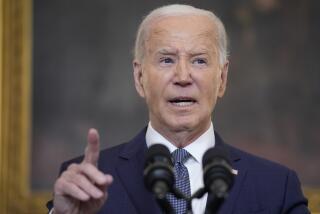U.S. Seeking Less Abrupt Arms Cuts in New Talks
GENEVA â American negotiators here have been instructed by the White House to take a more gradual approach to arms reduction than President Reagan took with Soviet leader Mikhail S. Gorbachev in Iceland, U.S. officials said Wednesday.
The officials here and in Washington declined to discuss details, but according to other sources, the new approach will call for a phased withdrawal of intermediate-range missiles from Europe.
At their meeting in Iceland on Oct. 11-12, Reagan and Gorbachev had discussed withdrawing all U.S. and Soviet intermediate-range weapons from Europe within five years and reducing by about 50% the arsenals of long-range ballistic missiles on both sides.
The two leaders had tentatively reached agreement on such matters, but then Gorbachev insisted that no accord could be finalized unless the United States also accepted strict limitations on its Strategic Defense Initiative, the space-based missile defense system.
According to sources here, the United States will propose today, partly out of deference to its European allies, that the withdrawal of intermediate-range weapons should be carried out gradually rather than abruptly. European leaders, while generally supporting the Presidentâs approach, had expressed concern that a sudden withdrawal of U.S. missiles would leave Europe vulnerable to the Soviet Unionâs superior conventional forces and its short-range missiles.
In Washington, an official discussing the new instructions to the negotiators said, âstuff has gone outâ of the U.S. position since the Iceland meeting. âBut this is a process,â he said. âThere was lots to talk about at Geneva even before the new instructions were sent.â
The instructions were dispatched earlier this week to the negotiators here, who are carrying out three-part talks with their Soviet counterparts on strategic weapons, intermediate-range missiles and space-based and other defensive systems.
Karpov Returns
Viktor P. Karpov, the chief Soviet negotiator, returned to Geneva on Wednesday after a week of consultations in Moscow, and the Americans hope the Soviets are now ready to move forward quickly on the outline agreements reached in Iceland.
Max M. Kampelman, the chief American negotiator, is to meet with Karpov informally today to find out what the Soviet negotiating priorities are now.
In particular, the Americans will be looking for a statement from the Soviets clarifying their interpretation of the 1972 Anti-Ballistic Missile Treaty and its application to the Strategic Defense Initiative, commonly called âStar Wars.â
The Soviets continue to insist, as Gorbachev did at the summit, that an agreement to limit development and testing of SDI technology has to be part of any package deal on nuclear arms control.
Vienna Meeting
Nobody expects a quick solution to this or any of the other negotiating problems in the Iceland package, but members of the U.S. delegation say they would like to be able to take a good progress report to Vienna, where Secretary of State George P. Shultz is scheduled to meet with Soviet Foreign Minister Eduard A. Shevardnadze on Nov. 5-6.
According to these sources, a clear indication that progress is being made here would probably produce in Vienna an agreement for Shultz and Shevardnadze to meet again early in the new year to get plans for a Washington summit meeting back on track.
President Reagan insists that he is not going to make any special concessions to Gorbachev to get him to go to Washington. Accordingly, Kampelman will not be making any proposals to Karpov when they meet today. He will simply be asking, in effect, âWhere do we go from here?â
This question applies in particular to the Strategic Defense Initiative and the proposed 10-year extension of the ABM treaty that was left on the table in Reykjavik. The position Reagan took in Iceland will be repeated in Geneva--that the United States is not in violation of the ABM treaty with its SDI testing and development program, and is prepared to guarantee that it will not deploy a space defense system during a period that includes a 10-year extension of the treaty.
âGlad to Look at Itâ
âIf they want to propose some further restrictive interpretations or definitions of the treaty language,â an American here said, âwell, we will be glad to look at it and discuss it with them, but we have nothing to propose, and we are satisfied that our interpretation of the treaty is completely within its terms and meaning.â
The Soviets have been less than clear about exactly what it is they want. Although Gorbachev has talked about limiting the SDI testing program to the laboratory, the Soviets have never put this in writing.
In Moscow, a Foreign Ministry spokesman, Gennady I. Gerasimov, told newsmen earlier this week:
âAs to the specific interpretation as to what we mean by laboratory testing, our experts do not yet agree, but, anyway, any interpretation of testing in the laboratory must exclude any testing in outer space.â
It is clarification of this kind that Kampelman will be seeking from Karpov.
Times staff writer Norman Kempster, in Washington, contributed to this story.
More to Read
Sign up for Essential California
The most important California stories and recommendations in your inbox every morning.
You may occasionally receive promotional content from the Los Angeles Times.










